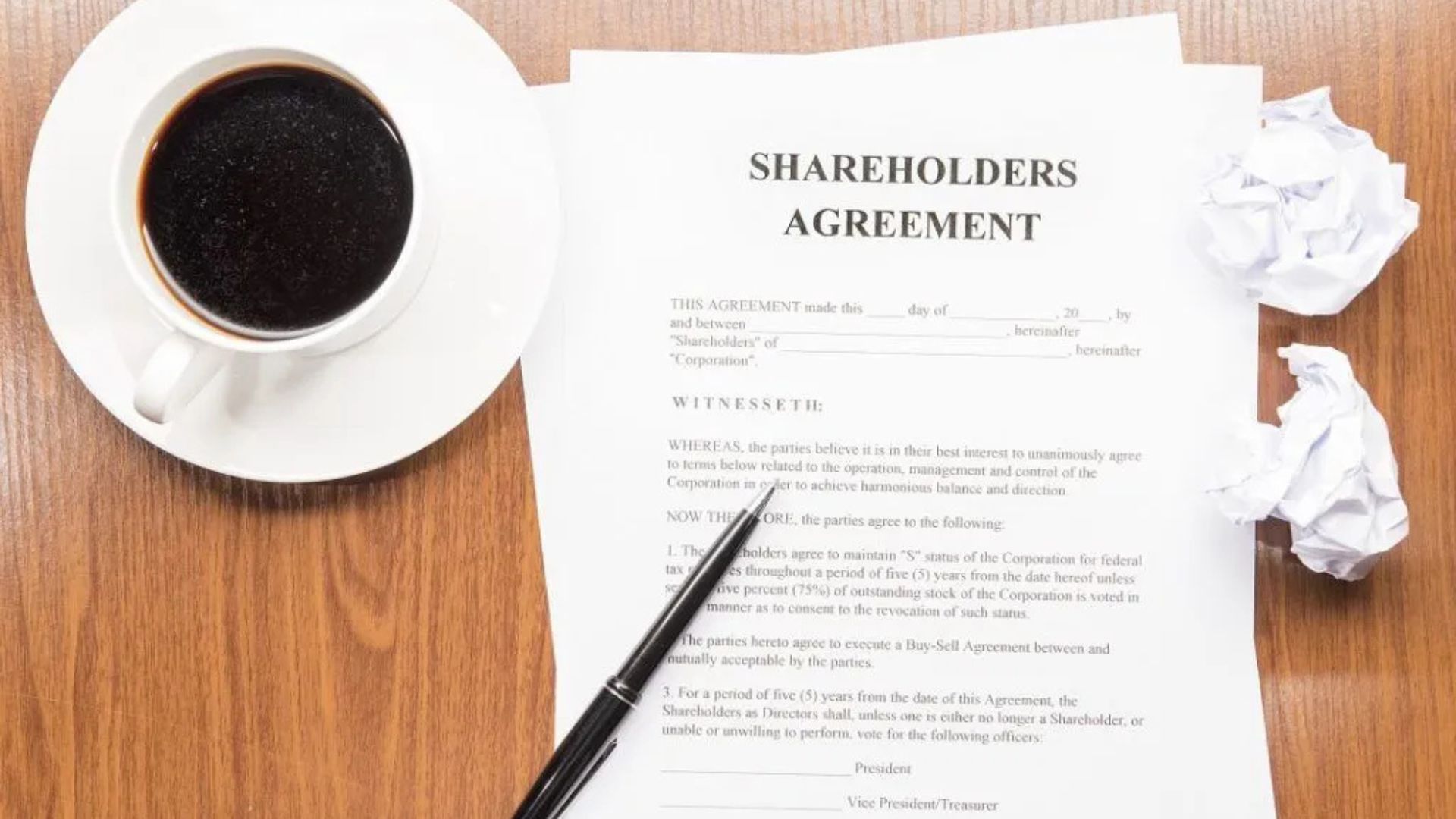Shareholder agreements are very crucial legal documents in private equity and venture capital transactions. They protect the rights and obligations of all shareholders through smooth governance and clarity on issues concerning profit distribution, decision-making, and exit strategies. Private equity and venture capital transactions largely rely on well-drafted shareholder agreements that keep transparency intact and manage potential conflicts between shareholders. In this text, we are discussing the importance of shareholder agreements within private equity and venture capital deals and the main characteristics that define it.
What is a Shareholder Agreement?
A shareholders’ agreement would be a legal document outlining the rights, responsibilities, and obligations of shareholders in a company. Such an agreement would manage the relationship both the shareholders have with the board of directors and, further, protect them against potential conflict. Unlike the articles of association, however, a shareholder agreement is usually a private agreement between the parties involved- and, unlike public documents of the company’s articles of association.
Key Functions of a Shareholder Agreement
- Ownership Rights Regulation: It further defines how shares would be distributed and in what way they could be transferred or sold which, in fact regulates ownership rights.
- Decision-Making Processes: It details how decisions in areas such as mergers or acquisitions are actually made to ensure that all shareholders are involved and heard.
- Dividend Distribution: It outlines rules regarding the mechanism through which profit is to be distributed. In this way, distribution of dividend ensures that shareholders receive what is rightfully and owing to them as promised before hand.
- Protection of Minority Shareholders: A shareholder agreement may elucidate specific rights and protection afforded to minority shareholders so that the interests and voting powers of minority shareholders cannot be superceded by majority shareholders.
- Exit strategy and dispute resolution: The document clearly spells out the principles of selling shares or exit from the company and mechanisms for disputes between shareholders.
Role of Shareholder Agreement in Private Equity
Usually, private equity investments involve heavy investment in established businesses with the aim of streamlining operations and growing the business to achieve an adequate exit. The shareholder agreement fits into this context because the agreement specifies the relationship between private equity investors and existing shareholders. According to law courses, This agreement is quite fundamental in ensuring that both parties keep the same governance and exit strategies.
- Control and Voting Rights: In a private equity transaction, the bargaining chip usually involves getting control of the company. The shareholder agreement would specify voting rights, board representation, and decision-making authority under the deal between the private equity firm and the founders or the existing shareholders. Conditions for reserved matters might be included, which are usually those decisions that must be agreed upon by all the shareholders.
- Drag-Along and Tag-Along Rights: These form common elements of private equity shareholder agreements. Drag-along rights will typically allow majority shareholders to force minority shareholders to sell their shares if the majority agree to the sale. This would ensure that a sale could proceed with certainty, not being blocked by a small group of shareholders. Tag-along rights protect minority shareholders by giving them the right to join if majority shareholders opt to sell their stake.
- Exit Provisions: The exit is considered to be the concluding part of a private equity deal. The shareholder agreement will establish provisions regarding how and when the private equity firm can exit its investment. It might either be an IPO, trade sale, or other mechanisms which may lead up to a management buyout. The provisions for starting such an exit as well as distribution of the exit proceeds will always be specific to avoid conflict later on.
- Anti-Dilution Protection: Private equity investors may agree to have an anti-dilution clause inserted in the shareholder agreement that will protect their investment. This clause protects the previously issued shares of private equity investors in case there are new issues at a lower valuation by preventing dilution, either with regard to the price paid for the diluted equity or by increasing the number of shares issued to them.
Importance of Shareholder Agreements in Private Equity
- Governance Clarity: It defines what role and responsibility players of investors and management are supposed to play.
- Alignment of Interests: Puts every party in alignment on growth and exit strategies.
- Risk Mitigation: This management plan also encompasses risk mitigation. It helps manage the risks in terms of ownership disputes, share dilution, and control on major business decisions.
Role of Shareholder Agreement in Venture Capital
Shareholder agreements help investors and founders align on most key business issues on control, fundraising, and exit strategies in ventures. In venture capital deals, shareholder agreements are particularly focused on protecting the interests of both the founders and the investors as it is a field that targets startups and early-stage companies needing capital to grow. Private equity, however, focuses more on mature companies which can tolerate big capital infusion or investments.
- Founder Lock-in and Vesting Schedules: Venture capital investors especially have a concern for the commitment of the founding team. Shareholder agreements in venture capital, generally contain vesting schedules for founders’ shares so that the founders get their equity over time and stay motivated to contribute toward the growth of the business. In case a founder leaves early, he may lose some of the shares.
- Liquidation Preference: An important element of shareholder agreements in venture capital. This establishes that when a company is sold or otherwise liquidated, the venture capital investors are paid out first. The provision specifies how much and in what order this is done before the common shareholders are entitled to their money. This may be the founders and employees.
- Composition and Control Over the board: Boards of directors Board composition and control Venture capitalists often insist on obtaining a place within the board of directors as part of their investment. The shareholders’ agreement would then specify how much to give to investors versus the founders. This would then ensure that investors obtain the choice in significant business decisions without totally taking away governing power from the founders.
- Pre-emptive rights: These rights give a venture capital investor the right to subscribe to further shares if the company decides to raise its subsequent rounds of funding so that this percentage of ownership is maintained. It, therefore, becomes important as a clause that safeguards the interest of early investors in preventing dilution of their interest in case the company chooses to issue fresh shares at a higher valuation when it raises further rounds.
- Exit Provisions: The venture capital investor would normally exit the company by an initial public offering or through a merger or acquisition within a short period of 3-5 years. The Shareholder Agreement would indicate what constitutes an exit and distribute the proceeds accordingly amongst the shareholders.
Importance of Shareholder Agreements in Venture Capital
- Founder-Investor Alignment: It should ensure that the founders and investors are in sync with the discussed growth trajectory of the company as well as exit goals.
- Investor Protections: Venture capital investors are protected against the risks of founders leaving, dilution of equity share, and loss of control.
- Clear Structures of Governance: This lays out the roles of the board and its voting rights; thus, governance becomes streamlined as the organization grows.
Characteristics of Shareholder Agreement
Shareholder agreements are made according to the needs of the business in relation to its shareholders, though there may be some common characteristics that define most shareholder agreements, especially in private equity and venture capital contexts.
- Confidentiality: Shareholders’ agreements may have a provision on confidentiality whereby the shareholders can’t disclose the company’s private information to third parties. These provisions become more essential in the venture capital and private equity deals where intellectual property and business strategies are considered core assets.
- Transferability of Shares: Typically, such agreements contain strict provisions regarding the transfer, sale, or inheritance of shares. It is indeed very crucial for private equity and venture capital where ownership control is only the determinant of holding governance stability.
- Dispute Resolution Mechanisms: It may be included in the shareholder agreement, and there might be a mechanism of dispute resolution specifying how the disputes between shareholders should be resolved. These disputes are resolved through arbitration or mediation, or jurisdictions in certain cases for a legal suit.
- Right of First Refusal: In a shareholders’ agreement, often, there is allowed right of first refusal to shareholders. That is, shareholders are granted the right of first refusal such that, if a shareholder wants to sell his shares, existing shareholders will have a first chance of buying them before they offer them to third parties.
- Deadlock Provisions: A shareholder agreement may have provided a mechanism for dealing with deadlock situations arising from disagreement among shareholders. Such might include having a third-party arbitrator who is to decide the next course of action or a forced buyout of one party.
Shareholder agreements, therefore, are one of the most important things any individual who engages in corporate law courses should understand; hence, the courses on the same are worth undertaking to get knowledge on how to draft and negotiate shareholder agreements.
Conclusion
Shareholder agreements are crucial in any private equity and venture capital deal. It creates an organized manner of how relationships are managed, decisions are made, and exit strategies are set. Protection of the rights of investors and founders alike is created via a shareholder agreement, thus establishing common ground for essential issues. Due to the complex nature of such deals, an expertly prepared shareholder agreement is sure to smoothen governance and minimize any future conflicts.










